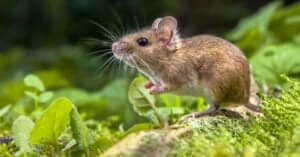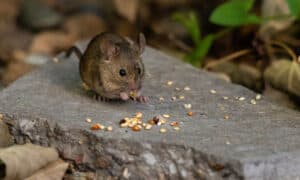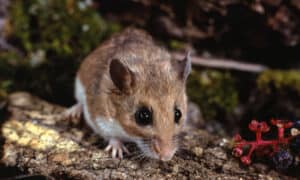Gerbils are small rodents that are kept as pets all over the world, although the species originates from Mongolia. Their full name, the Mongolian Girbil, reflects their origination, but the species was brought to the United States in 1954 where they were first kept as pets. These mice-like rodents live in arid environments like grasslands, deserts, and steppes in Mongolia and China. Since being brought to the West, gerbils have become one of the most popular pets in the world and have been used extensively in scientific research and studies. Whether just curious or a pet owner, it’s important to know what these little rodents eat. Le’s look and learn: what do gerbils eat?
What do gerbils eat?
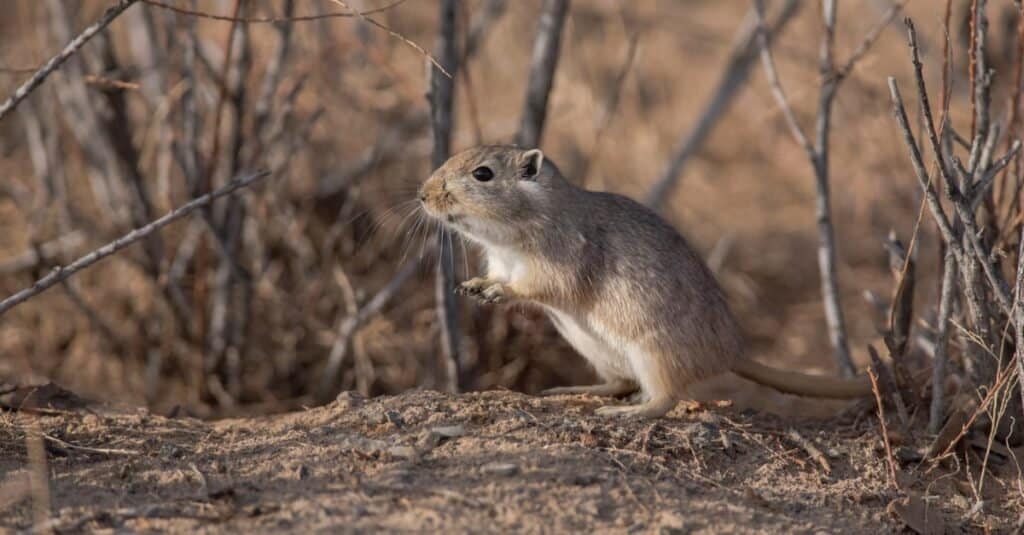
Gerbils are omnivores that eat insects, fruits, seeds, and nuts.
©Wildpix productions/Shutterstock.com
Gerbils eat crickets, locusts, worms, beetles, seeds, grasses, and fruit.
Gerbils are omnivores and pretty much eat anything they come across. Since they are found in the wild and are often kept as pets, it’s important to note the difference in diet between the two. Still, wild gerbils and domestic gerbils have the same dietary capability, but their different environments influence their diets in various ways.
What do wild gerbils eat?
Wild gerbils live in grasslands and deserts, making them quite adept at finding food wherever they can. Although they are omnivores, wild gerbils prefer to eat insects. Since they are endemic to a few different locations, the specific insects they eat will vary by location.
Common insects that gerbils eat include flies, worms, crickets, beetles, insect larvae, grasshoppers, and more. Essentially, any small insects that are able to be caught are likely to be prey for a hungry gerbil.
Additionally, wild gerbils supplement their diet with plant material. Since they live in mostly arid environments, finding grasses isn’t difficult, but finding fruits is. In the wild, gerbils will eat grasses, seeds, grains, certain roots, branches with fruits or berries, and more.
What do pet gerbils eat?
Since gerbils in captivity aren’t in a survival situation, their food can be a bit more varied and interesting.
Generally, gerbil owners can buy “gerbil food” from a pet store or online. Most gerbil foods contain things like nuts, seeds, corn flakes, dehydrated vegetables, and nutrient powder, giving them almost all of what they need for their health. For some pet owners, however, gerbil food is just the start.
Some owners choose to supplement their gerbil food with fruits and vegetables. Since pet food often has the major things a gerbil needs to live, fruits and veggies are viewed as more of a treat than a necessity. Still, your gerbil will love getting to munch on carrots, apples, bananas, grapes, and a few others. These can help keep your gerbil healthy when given in suitable amounts.
When it comes to dietary enrichment and mental stimulation, some owners even fed their gerbils live insects to hunt. Since it’s a natural instinct for them, many owners want to enrich their lives with a little insect treat now and again. Common insects fed to pet gerbils include mealworms, waxworms, crickets, and locusts. Some sources say that a gerbil’s diet should be 16% protein, and since insects are between 15-22% protein, they can make a healthy treat.
A complete list of foods gerbils eat
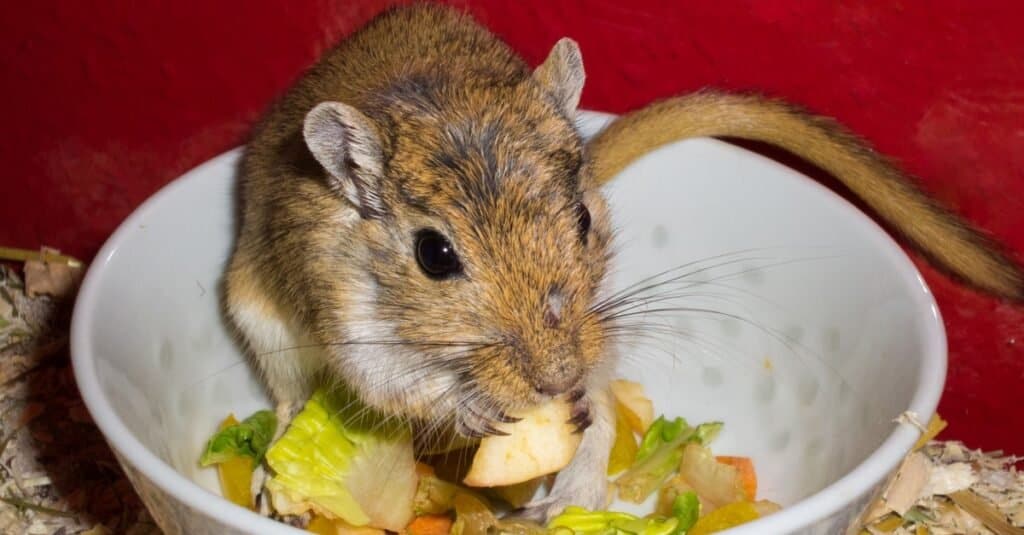
Gerbils prefer diets that are around 16% protein and get their water from wild insects.
©Jearu/Shutterstock.com
Here is a complete list of the common foods a gerbil can eat:
- crickets
- flies
- mealworms
- wax worms
- super worms
- gerbil food
- sunflower seeds
- pumpkin seeds
- walnuts
- corn flakes
- millet
- Apple
- Banana
- Broad beans
- Blueberries
- Carrot
- Cauliflower
- Chicory
- Dandelion
- Grape
- Grass
- Pea
- Parsnip
- Pear
How do gerbils get their food?
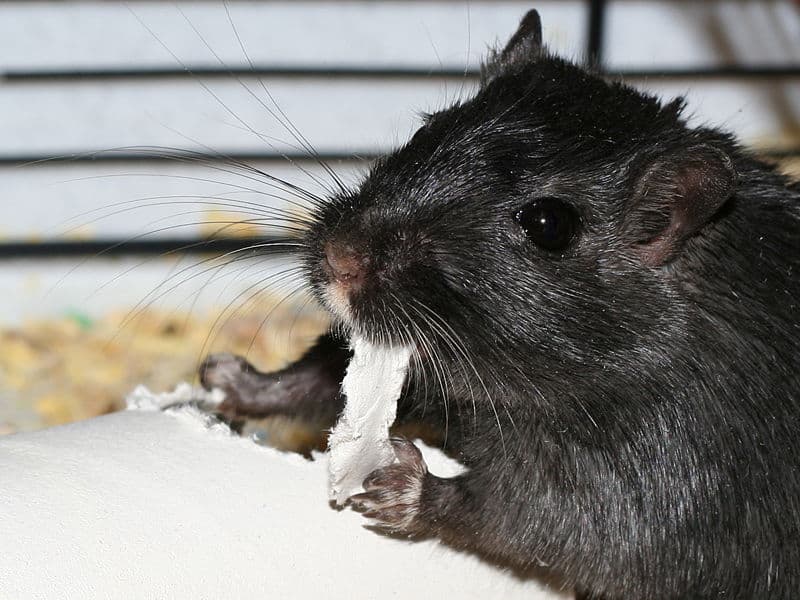
Gerbils are usually diurnal, hunting and foraging for food during the day.
The tough environments that gerbils come from have allowed them to specialize and adapt in some amazing ways. In semi-desert and arid environments, these little rodents can survive on little food and essentially no water.
As omnivores, gerbils use a combination of hunting and foraging to get their nutritional needs. When it comes to hunting, gerbils are diurnal (they are active during the day), just like humans. Insects that gerbils spot are simply run down and grabbed. With a swift bite, gerbils are able to kill and devour any bugs that are smaller than it is. Since they are specialized to live in low-moisture environments, gerbils get most of the water they need from the insects they kill. Additionally, they have evolved the ability to excrete significantly less water.
As foragers, gerbils spend much of their day napping and looking for plant material. Nearly everything can be on the menu for gerbils. Seeds, nuts, and grasses are among the most common food sources since they are the most plentiful. In some situations, gerbils will eat roots, bulbs, and plant leaves as a supplement.
What foods are dangerous to gerbils?
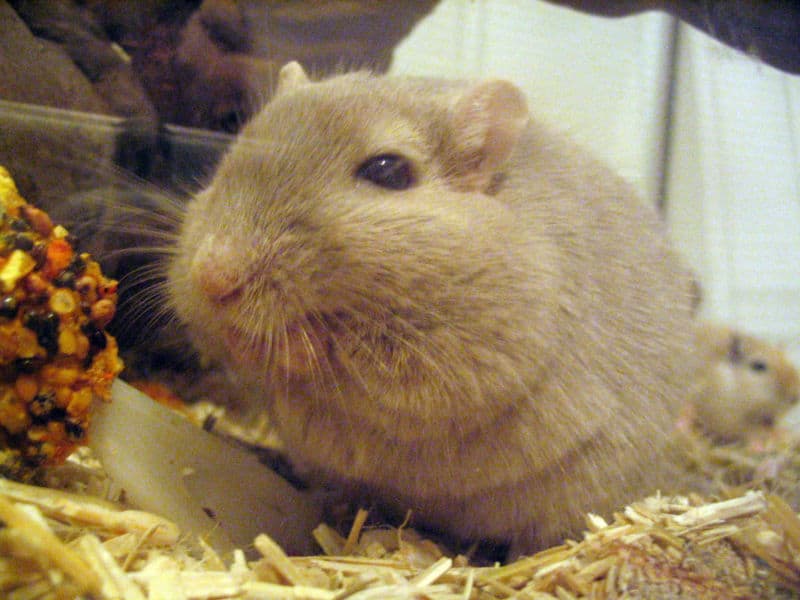
Gerbils shouldn’t eat human food unless explicitly recommended by experts.
In captivity, there are a few foods that humans should not give gerbils. Whether they’re simply unhealthy or toxic, many foods seem to make sense, but in reality, they could fatally harm your pet.
Toxic foods include eggplants, citrus, garlic (or anything in the allium family), onions, and wildflowers or plants. Often, pesticides and road runoff can stick on plants found in a backyard and can be harmful to pet gerbils.
Additionally, there are some foods that seem to “make sense” but actually harm gerbils. The top contenders are cheese and bread. There is a stereotypical image of rodents enjoying both of these but they are actually unhealthy for pet gerbils. Additionally, anything sweet, including jams and spreads, should be avoided.
What predators eat gerbils?
As rodents, gerbils are pretty low on the food chain and have plenty of natural (and domestic) predators. In the wild, snakes, birds, wildcats, and foxes, and almost any other carnivore that eats rodents. When groups of gerbils in the wild notice a predator, they will drum their feet to arm the rest of the colony that a threat is near.
In captivity, rough handling, cats, and dogs are the usual offenders for gerbil death. Additionally, poor hygiene and dietary issues can cause the premature death of gerbils.
The photo featured at the top of this post is © iStock.com/neil bowman
Thank you for reading! Have some feedback for us? Contact the AZ Animals editorial team.



